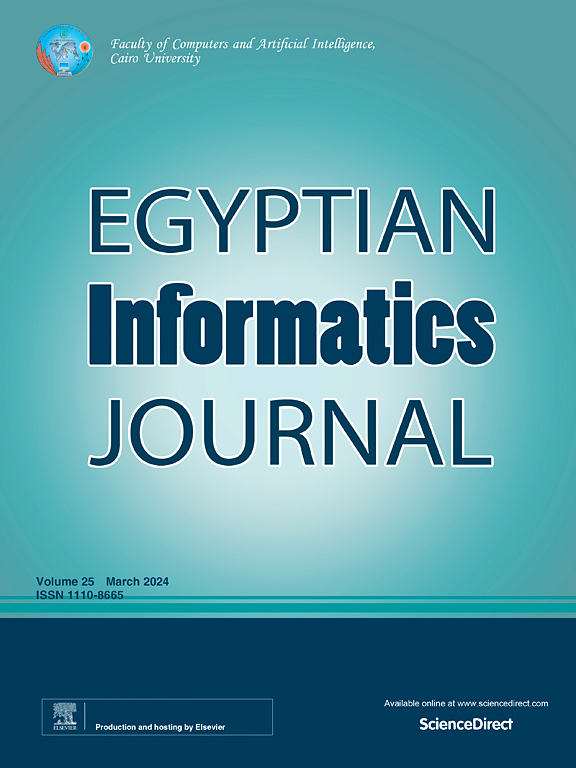An optimized feature selection using triangle mutation rule and restart strategy in enhanced slime mould algorithm
IF 4.3
3区 计算机科学
Q1 COMPUTER SCIENCE, ARTIFICIAL INTELLIGENCE
引用次数: 0
Abstract
This paper proposes an improved feature selection method based on an improved Slime Mould Algorithm (SMA), called the Triangular Mutation Rule Restart Strategy Slime Mould Algorithm (TRSMA), to overcome some of the shortcomings of the SMA, including premature convergence, poor population diversity, and local optima entrapment. The TRSMA uses three main strategies: (1) Good Point Set (GPS) initialization for better initial population diversity, (2) Triangular Mutation Rule (TMR) for better global exploration and finding higher-quality areas in the solution space, and (3) a Restart Strategy (RS) to reinitialize weak individuals to escape from local optimum. Then we combine the TRSMA with Support Vector Machines (SVM) and propose the TRSMA-SVM model to select the joint feature and classifier parameters. Experimental results on nine University of California, Irvine (UCI) datasets and a real-world malaria dataset show that TRSMA-SVM consistently outperforms recent state-of-the-art methods regarding classification accuracy with fewer selected features. Comparison with benchmark testing on CEC2017 functions confirms TRSMA’s ability to perform global optimization. Statistical tests using the Wilcoxon rank-sum and Friedman tests also verify these performance gains. The results illustrate that TRSMA is powerful and can handle complex high-dimensional optimization problems.
基于三角形突变规则和重启策略的增强黏菌算法特征选择优化
本文提出了一种基于改进的黏菌算法(SMA)的改进特征选择方法,即三角突变规则重启策略黏菌算法(TRSMA),克服了黏菌算法过早收敛、种群多样性差和局部最优陷阱等缺点。TRSMA采用三种主要策略:(1)良好点集(GPS)初始化以获得更好的初始种群多样性;(2)三角突变规则(TMR)用于更好的全局探索并在解空间中找到更高质量的区域;(3)重启策略(RS)用于重新初始化弱个体以摆脱局部最优。然后将TRSMA与支持向量机(SVM)相结合,提出了TRSMA-SVM模型来选择联合特征和分类器参数。在加州大学欧文分校(UCI)的9个数据集和一个真实世界的疟疾数据集上的实验结果表明,在选择特征较少的情况下,TRSMA-SVM在分类精度方面始终优于最近最先进的方法。与CEC2017函数的基准测试比较,证实了TRSMA执行全局优化的能力。使用Wilcoxon秩和和和Friedman测试的统计测试也验证了这些性能增益。结果表明,该算法具有强大的功能,可以处理复杂的高维优化问题。
本文章由计算机程序翻译,如有差异,请以英文原文为准。
求助全文
约1分钟内获得全文
求助全文
来源期刊

Egyptian Informatics Journal
Decision Sciences-Management Science and Operations Research
CiteScore
11.10
自引率
1.90%
发文量
59
审稿时长
110 days
期刊介绍:
The Egyptian Informatics Journal is published by the Faculty of Computers and Artificial Intelligence, Cairo University. This Journal provides a forum for the state-of-the-art research and development in the fields of computing, including computer sciences, information technologies, information systems, operations research and decision support. Innovative and not-previously-published work in subjects covered by the Journal is encouraged to be submitted, whether from academic, research or commercial sources.
 求助内容:
求助内容: 应助结果提醒方式:
应助结果提醒方式:


